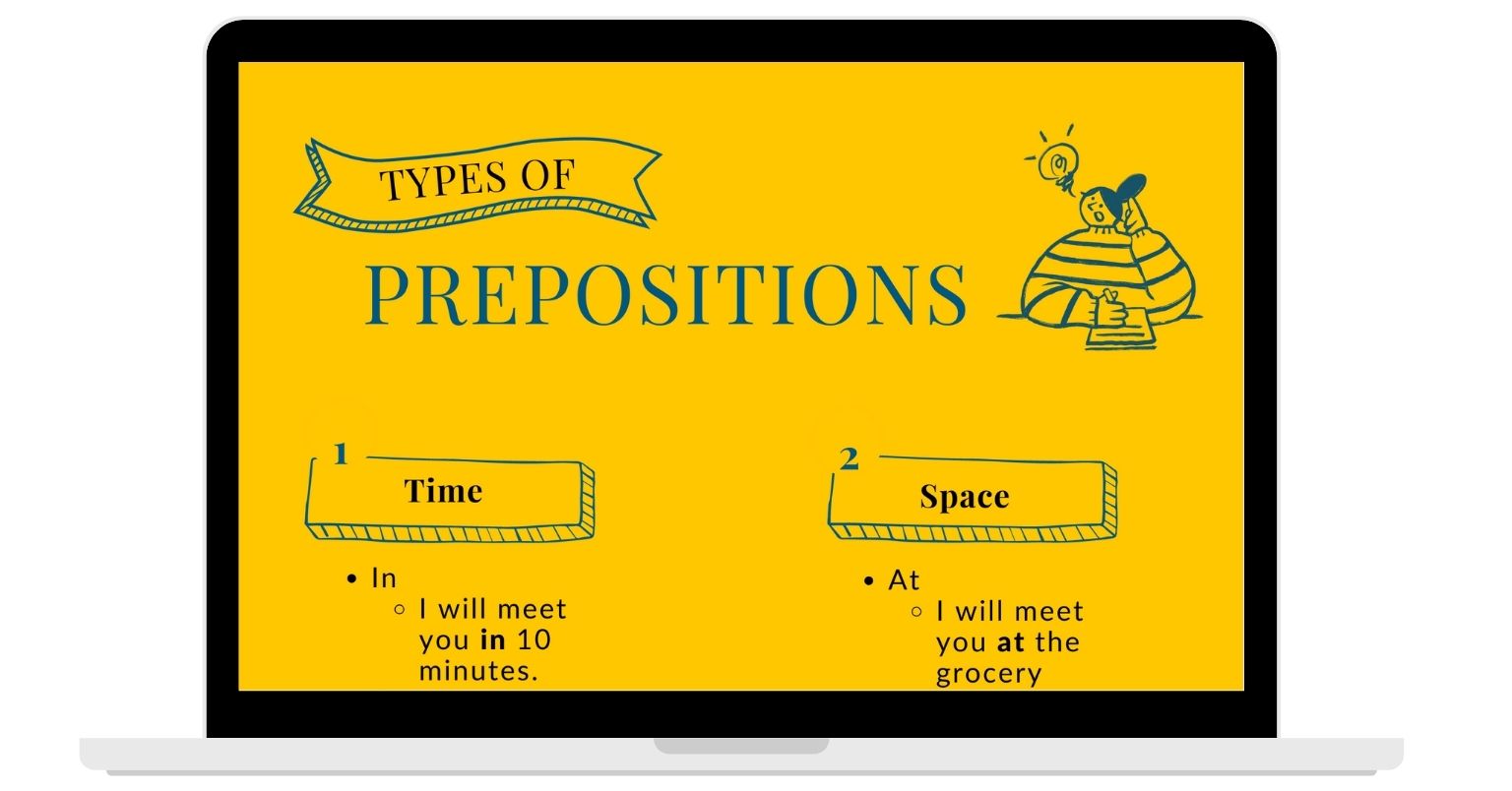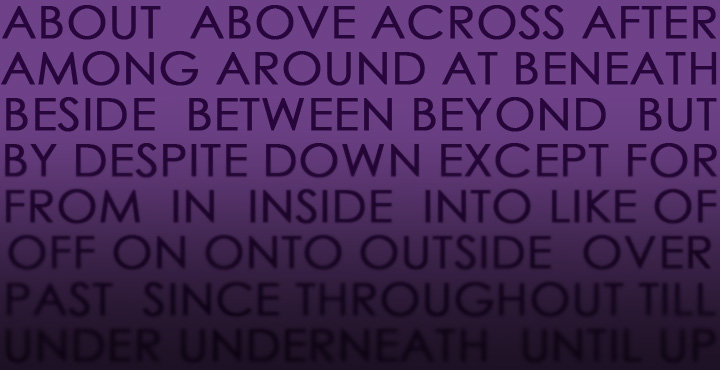Written by Scribendi
You may have heard the word "preposition" before, but you might be asking yourself, "What is a preposition?"
Our introduction to prepositions teaches you what a preposition is using definitions and examples. Did you know that there are different types of prepositions and different rules for prepositions, depending on the context?
Every type of word in English, be it a noun, adverb, or conjunction, serves a different purpose to ensure proper sentence structure. The use of prepositions in English specifically allows writers to orient readers.
Preposition Examples: Download Infographic Now

What is a Preposition in a Sentence?
Google's English Dictionary defines "preposition" as follows:
A word governing, and usually preceding, a noun or pronoun and expressing a relation to another word or element in the clause.
It also provides the following examples of prepositions used in a sentence:
"The man on the platform."
"She arrived after dinner."
"What did you do it for?"
Prepositions are important because they help writers guide readers by expressing the relationships of various elements to one another. This is usually to introduce a new element or to show time, space, or direction.
How to Use Prepositions
Some extremely common examples of prepositions include "in," "on," and "at."
Here are other examples of prepositions:
-
Between
-
For
-
Of
-
Off
-
To
-
Until
-
With
A preposition is always followed by at least one object, usually a noun (e.g., "The dog is sitting between the kids").
As prepositions are used as links, they are typically not used at the ends of sentences. For example, instead of asking "Is this the ship we are going on?", you might say, "Is this the ship on which we are going?"
However, an exception can be made, as in most cases, for casual writing (e.g., "Lonnie didn't tell me when they were staying until").
Follow these 5 Rules for Effective Academic Writing.
Using Prepositions: In, On, and At
So now you know "on" is a preposition, but did you know that there are different types of prepositions?
In English, we have prepositions of time, space, direction, and introduction. For example, "in," "on," and "at" are simple prepositions.
Having different types of prepositions in your arsenal will help you formulate sentences properly. Let's dive in!
Time
Preposition words used to describe time include the following:
-
In
-
I will meet you in 10 minutes.
-
From
-
It's supposed to occur from 12 PM until 1 PM.
-
Through
-
The meeting went through lunch.
Space
"Out" and "over" are some common examples of prepositions of space. Here are more!
-
At
-
I will meet you at the grocery store.
-
Beside
-
It's beside the variety store.
-
Over
-
It's right over there.
Direction
Prepositions of direction include the following:
-
Behind
-
She is behind the tree.
-
Into
-
She follows the path into the woods.
-
To
-
She goes to her grandmother's house.
Introduction
Here are some introductory prepositions:
-
After
-
After the storm, we slept soundly.
-
During
-
During the storm, we did not sleep.
-
Under
-
Under the covers, we waited for the storm to end.
Preposition Examples: Download Infographic Now

As previously mentioned, prepositions show relationships and are used to establish connections. As a result, different types of prepositions show different types of relationships and establish different kinds of connections. For example, "in," "on," and "at" are simple prepositions.
For each type of preposition listed below, we provide a list of prepositions. We also provide numerous examples of prepositions to help you build your vocabulary.
Is "except" a preposition? Read more.
1. Prepositions and Prepositional Phrases
Prepositional phrases, or prepositional sentences, typically begin with prepositions. Unlike simple prepositions such as "in," "on," and "at," which only contain one word, prepositional phrases contain, you guessed it, entire phrases or groups of words.
Common prepositional phrases include "for example," "by the way," and "instead of."
List of Prepositional Phrases
Here's a list of prepositional phrases:
-
At last
-
By myself
-
For example
-
In addition to
-
By the way
-
On a regular basis
-
Without question
Prepositional Phrase Examples
The following sentences include prepositional phrase examples in bold.
-
At last, I can eat the potatoes.
-
I am going to eat them all by myself.
-
For example, I am eating one now.
-
In addition to the salad, he brought potatoes.
-
By the way, do you like potatoes?
-
I eat potatoes on a regular basis.
-
I could eat a potato every day, without question.
Feel free to refer back to this list of prepositional phrases.
Types of Prepositions Infographic
Download Now
2. Simple Prepositions
Simple prepositions, as their name suggests, usually contain only one word. Our examples above, "in," "on," and "at," are all simple prepositions.
Our use of prepositions in English is extremely frequent; that is, we use prepositions all the time without even noticing. For example, the last sentence has 3 prepositions: "of," "in," and "without." You'll use simple prepositions in most sentences. However, this doesn't mean you'll use them in every sentence (all that is required to form a complete sentence is a subject and a verb, e.g., "She prances").
List of Simple Prepositions
Here is a list of simple prepositions:
-
After
-
At
-
By
-
For
-
In
-
On
-
To
Simple Preposition Examples
The following sentences contain simple preposition examples in bold:
-
After we watch the movie, let's go to the park.
-
We're at the theater already.
-
We parked by the restaurant.
-
We wait for popcorn.
-
We find our seats in a back aisle.
-
My eyes are on the screen.
-
It's time to watch the movie.
Types of Prepositions Infographic
Download Now
3. Double Prepositions
Double prepositions are composed of two simple prepositions that are combined to create a new word. Some examples to clarify this concept include "into," "onto," and "throughout."
The fact that these words exist shows how often we use preposition words, even in combination, to describe relationships with various people, places, and things.
List of Double Prepositions
Here's a list of double prepositions:
-
Amid
-
Inside
-
Into
-
Onto
-
Throughout
-
Upon
-
Without
Double Preposition Examples
Here are some examples of double prepositions (in bold) used in sentences:
-
Amid the crowd, I pursued him.
-
But inside the store he went.
-
I followed him into the store.
-
From the attic, he climbed onto the roof.
-
Throughout the city, I chased him.
-
Once upon a time, he told me everything.
-
He left without me.
Types of Prepositions Infographic
Download Now
4. Compound Prepositions
Compound prepositions are formed when a preposition prefixes a noun, adjective, or adverb.
To understand this concept best, consider the following examples: "along," "outside," and "without."
List of Compound Prepositions
Some examples of compound prepositions are as follows:
-
Across
-
Along
-
Around
-
Before
-
Beneath
-
Beside
-
Outside
Compound Preposition Examples
In bold below are some compound preposition examples.
-
I walked across the grass.
-
I walked along the path.
-
Around the corner was a cat.
-
I pet it before sitting down.
-
The grass beneath me.
-
The cat sat beside me.
-
Outside, the sun was warm.
Types of Prepositions Infographic
Download Now
5. Participle Prepositions
Participle prepositions are prepositional verbs, or verbs that also function as prepositions. They typically end in "ed," "ing," or "en."
Some common examples include "considering," "including," and "regarding." This shows how our use of prepositions also extends to verbs.
List of Participle Prepositions
Here are some participle prepositions:
-
Considering
-
During
-
Following
-
Given
-
Including
-
Provided
-
Regarding
Participle Preposition Examples
Some examples of participle prepositions are listed below.
-
Considering the circumstances, I don't want to go.
-
It's during work anyway.
-
Following my shift, I will see if there is time.
-
Given my shift ends late, there probably will not be.
-
There will be more opportunities, including one next week.
-
We can see you then, provided you are free.
-
We will discuss the items regarding the project then.
Types of Prepositions Infographic
Download Now
Ending a Sentence With a Preposition
Ending a sentence with a preposition is acceptable only in informal contexts. While it is not technically incorrect to do so, it is best not to end a sentence with a preposition in academic or business writing, as doing so is informal.
Improve Your Academic Essay Writing Skills. Read more.
However, in informal contexts, such as in emails to friends, it is correct and sometimes even more natural to end a sentence with a preposition (e.g., "What did you do that for?").
Unnecessary Prepositions
Sometimes, writers include preposition words unnecessarily. It is preferable to write concisely and reduce wordiness in formal writing; as such, it is best to cut unnecessary prepositions where possible.
Here is a list of unnecessarily wordy prepositions:
-
Meet with
-
Miss out on
-
Outside of
Unnecessary Preposition Examples
Here are some examples of prepositions that may be deemed unnecessary:
-
Unnecessary: Let's meet with him tomorrow.
-
Revised: Let's meet him tomorrow.
-
Unnecessary: We don't want to miss out on it.
-
Revised: We don't want to miss it.
-
Unnecessary: He'll be outside of the building at 1.
-
Revised: He'll be outside the building at 1.
Frequently Asked Questions
Can You End a Sentence With a Preposition?
While it is not technically incorrect to end a sentence with a preposition, it is considered informal. Whether you should end a sentence with a preposition depends on whether you are writing a formal or informal document.
Formal documents, such as academic papers and business memos, should not contain sentences ending with prepositions; instead, prepositions in sentences should be located elsewhere (where appropriate).
Avoid these other common mistakes in academic writing.
However, in casual writing, such as text messages or emails, it is perfectly acceptable to end a sentence with a preposition.
What Do All Prepositions Have in Common?
Prepositions typically occur before a noun or pronoun. Their purpose is to indicate the relationships between various words in a sentence.
They are typically short words denoting spatial or temporal relationships. There are various types of prepositions; as such, the best way to learn preposition words is to memorize them.
What Do Prepositions Do?
Prepositions indicate relationships between words in a sentence, typically related to location or time. They are also used to introduce objects. They typically precede nouns or pronouns, and they are typically short words.
Most sentences contain prepositions. However, prepositions are not required for full, complete sentences. While sentences with prepositions are used in both formal and informal writing, prepositions should not occur at the end of a sentence in formal writing.
What Are the Preposition Rules?
Prepositions and preposition phrases can be tricky to learn, but there are 3 fundamental rules you can follow to use them properly:
-
Prepositions, by definition, require an object.
-
Prepositions come before objects in sentences.
-
Prepositions are never followed by verbs.
As with all English grammar elements, there are always exceptions. If you are unsure about which word to use, consider consulting a friend or professional editor.
Is "being" a preposition? Read more.
What Are the Two Most Used Types of Prepositions?
The two most used types of prepositions are simple and compound prepositions.
Here are some sentences with prepositions that are simple:
-
We're in the restaurant.
-
The food is on the table.
-
Dinner is at 6.
Here are some sentences with prepositions that are compound:
-
I get along with everybody.
-
Inside the house, we chat.
-
What is life without friends?
Studying English? We’ll Help You Avoid Embarrassing Errors.
Try Our ESL Academic Editing Service, or Get a Free Sample
About the Author
Scribendi's in-house editors work with writers from all over the globe to perfect their writing. They know that no piece of writing is complete without a professional edit, and they love to see a good piece of writing turn into a great one after the editing process. Scribendi's in-house editors are unrivaled in both experience and education, having collectively edited millions of words and obtained nearly 20 degrees collectively. They love consuming caffeinated beverages, reading books of various genres, and relaxing in quiet, dimly lit spaces.










